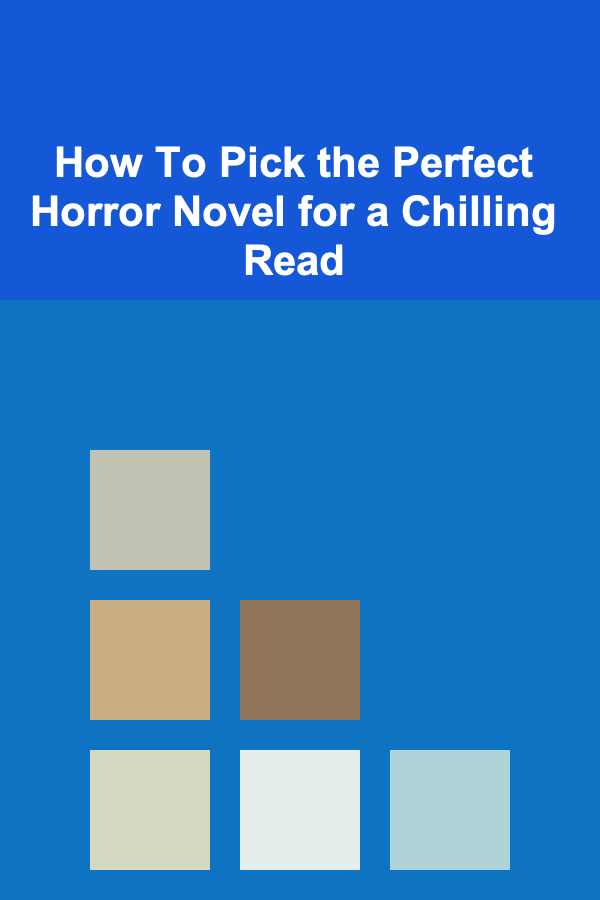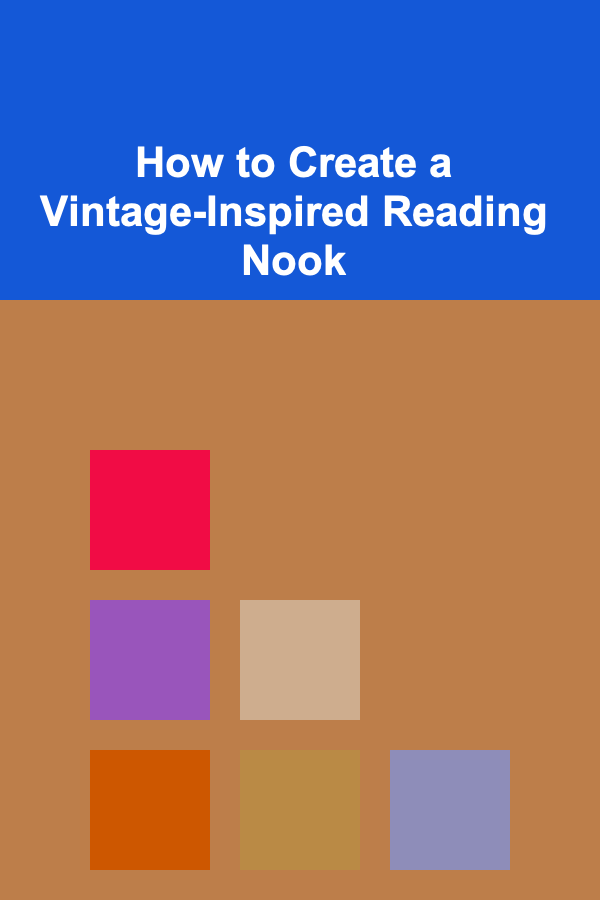
How To Pick the Perfect Horror Novel for a Chilling Read
ebook include PDF & Audio bundle (Micro Guide)
$12.99$6.99
Limited Time Offer! Order within the next:

Horror is a genre that has fascinated readers for centuries, offering the perfect blend of fear, suspense, and mystery. Whether you're a seasoned horror fan or a newcomer to the genre, finding the right book can make the difference between a memorable, spine-chilling experience and a lackluster, forgettable one. But with so many horror novels available, how do you choose the one that will keep you up at night?
In this article, we'll explore the essential factors to consider when selecting the perfect horror novel for a chilling read. From understanding different sub-genres to identifying what kind of scares resonate most with you, this guide will help you navigate the vast world of horror literature and find the book that's guaranteed to send shivers down your spine.
Understand the Different Sub-genres of Horror
One of the first steps in picking a horror novel is understanding that horror itself is a broad genre with numerous sub-genres. Different sub-genres offer varying kinds of scares, from supernatural frights to psychological terror. Knowing which type of horror appeals to you will help narrow down your options.
1.1. Supernatural Horror
Supernatural horror novels revolve around entities, forces, and phenomena that exist beyond the natural world. Ghosts, demons, vampires, and other supernatural beings take center stage, often leading to terrifying encounters with the unknown.
Examples : Stephen King's The Shining , Shirley Jackson's The Haunting of Hill House , and Henry James's The Turn of the Screw.
If you love the idea of creepy, otherworldly entities influencing the world around us, supernatural horror might be the sub-genre for you.
1.2. Psychological Horror
Psychological horror focuses on the human mind's fragility, often blurring the line between reality and madness. These novels tend to evoke a slow, creeping sense of fear as the characters experience mental and emotional breakdowns.
Examples : Shirley Jackson's We Have Always Lived in the Castle , Mark Z. Danielewski's House of Leaves , and Peter Straub's Ghost Story.
If you prefer books that leave you questioning your own sanity and dive deep into the psychological unraveling of characters, psychological horror could be a thrilling option.
1.3. Gothic Horror
Gothic horror often combines elements of romance, decay, and the supernatural, typically set in gloomy, decaying settings like old mansions or castles. The atmosphere is usually oppressive and mysterious, with an emphasis on mood over direct horror.
Examples : Mary Shelley's Frankenstein , Bram Stoker's Dracula , and Emily Brontë's Wuthering Heights.
If you enjoy intricate, atmospheric tales with a sense of dread and doom, gothic horror might be your perfect match.
1.4. Body Horror
Body horror focuses on the grotesque and disturbing transformations or mutilations of the human body. These novels often explore themes of disease, mutation, or physical decay, and can be deeply unsettling.
Examples : Clive Barker's The Hellbound Heart , David Cronenberg's The Brood , and Brian Lumley's Necroscope series.
If you don't mind the grotesque and find yourself fascinated by the darker side of the human form, body horror could be the sub-genre that delivers the chills you crave.
1.5. Survival Horror
Survival horror involves characters trying to survive against all odds, typically against horrific, life-threatening scenarios. Zombies, monsters, and apocalyptic settings are common, as are themes of isolation and despair.
Examples : Richard Matheson's I Am Legend , Stephen King's The Stand , and Cormac McCarthy's The Road.
If you're drawn to intense, edge-of-your-seat action with terrifying threats around every corner, survival horror will satisfy your need for suspense and adrenaline.
Explore Classic vs. Contemporary Horror
Another important decision when selecting a horror novel is whether to go with a classic or a contemporary piece. Each has its own merits, and understanding their differences will help guide your decision.
2.1. Classic Horror
Classic horror novels are those that have stood the test of time, often regarded as the cornerstones of the genre. These works frequently explore universal themes of fear and the unknown, and their atmospheres often rely heavily on atmosphere and tension-building. Classic horror novels tend to be slow-burners, with gradual buildups that culminate in powerful, terrifying moments.
Examples : Mary Shelley's Frankenstein , H.P. Lovecraft's The Call of Cthulhu , and Edgar Allan Poe's The Tell-Tale Heart.
Classic horror offers readers a glimpse into the foundations of the genre and is a great choice if you appreciate literature with historical significance and a slower, more methodical pace.
2.2. Contemporary Horror
Contemporary horror reflects the modern-day approach to fear and often tackles current societal fears or new forms of terror. These novels can be fast-paced, filled with unexpected twists and psychological insight, and often include more graphic depictions of horror.
Examples : Paul Tremblay's The Cabin at the End of the World , Josh Malerman's Bird Box , and Grady Hendrix's The Southern Book Club's Guide to Slaying Vampires.
Contemporary horror offers readers a fresh, up-to-date take on the genre, often exploring modern fears and anxieties. It's a great choice for those seeking a faster, more intense reading experience.
Identify the Type of Fear You Prefer
When selecting a horror novel, it's essential to think about what kind of fear affects you the most. Horror can come in many forms, from supernatural and visceral to emotional and psychological. Identifying which types of fear resonate with you will help ensure your reading experience is both chilling and satisfying.
3.1. Fear of the Unknown
Many horror novels tap into our primal fear of the unknown. This kind of fear thrives on uncertainty, often leaving readers to imagine the horror that exists just beyond their reach. These books tend to be atmospheric, focusing on building a sense of dread rather than immediate terror.
Examples : Stephen King's It , Shirley Jackson's The Haunting of Hill House , and H.P. Lovecraft's At the Mountains of Madness.
If the idea of not knowing what's lurking in the shadows gets your heart racing, then you'll likely enjoy novels that focus on the fear of the unknown.
3.2. Fear of Physical Harm
Some horror novels rely on the fear of bodily harm, either through violence, injury, or mutilation. These books can be intense, graphic, and often explore the darker aspects of human nature.
Examples : Stephen King's Carrie , Clive Barker's The Hellbound Heart , and Joe Hill's Heart-Shaped Box.
If you're not squeamish and enjoy the visceral shock of physical harm, then these kinds of horror novels will likely satisfy your cravings.
3.3. Psychological Fear
Psychological horror is more about fear within the mind. These novels explore themes of mental breakdowns, obsession, and paranoia. The horror is not always tangible but rather manifests in a character's psyche, leaving readers to question what's real and what's imagined.
Examples : Shirley Jackson's We Have Always Lived in the Castle , Mark Z. Danielewski's House of Leaves , and Paul Tremblay's The Cabin at the End of the World.
If you prefer a more cerebral experience that explores the fragility of the human mind, psychological horror might be the perfect fit for you.
Consider the Setting and Atmosphere
Setting plays a vital role in the horror genre, contributing significantly to the atmosphere of dread and fear. Different settings can create distinct types of horror, and knowing what kind of environment you prefer will help you select the right novel.
4.1. Isolated Settings
Isolation is a common element in many horror novels, creating a sense of helplessness and vulnerability. Characters trapped in remote locations, such as haunted houses, desolate forests, or isolated islands, are forced to face their fears with no way to escape.
Examples : Stephen King's The Shining , Peter Straub's Ghost Story , and William Peter Blatty's The Exorcist.
If the idea of being trapped in an eerie, isolated location with no escape appeals to you, look for novels that emphasize these kinds of settings.
4.2. Urban Horror
Urban horror takes place in contemporary cities or towns, often featuring supernatural forces or horrific events disrupting the normalcy of everyday life. These novels blend the familiar with the eerie, making the horror feel closer to home.
Examples : Clive Barker's Books of Blood , John Ajvide Lindqvist's Let the Right One In , and Stephen King's Needful Things.
Urban horror is a good choice for those who want to be scared in familiar, everyday settings, where the horror feels like it could happen to anyone.
Think About the Writing Style
The writing style of a horror novel can also greatly impact the reading experience. Different authors have unique approaches to storytelling, and it's important to find one whose style resonates with you.
5.1. Slow-Burn vs. Fast-Paced
Some horror novels take their time to build tension and atmosphere, gradually increasing the sense of dread. These slow-burn stories rely heavily on mood and atmosphere to build suspense. Others are fast-paced, with action-packed scenes and sudden twists that keep readers on edge.
Examples of slow-burn : Shirley Jackson's The Haunting of Hill House , Stephen King's Salem's Lot.
Examples of fast-paced : Grady Hendrix's The Southern Book Club's Guide to Slaying Vampires , Paul Tremblay's The Cabin at the End of the World.
Deciding whether you prefer a slower, more atmospheric read or a quicker, more intense experience will help you pick the right book.
Read Reviews and Recommendations
Finally, one of the easiest ways to discover a great horror novel is by reading reviews and recommendations from fellow readers. Horror enthusiasts often share their thoughts on websites, forums, and social media, helping you find hidden gems or critically acclaimed works.
Look for recommendations from trusted sources, like well-known horror bloggers, book review websites, and forums like Reddit's r/horror. User reviews on platforms like Goodreads can also provide valuable insights into a book's pacing, plot, and scares.
Conclusion
Choosing the perfect horror novel doesn't have to be a daunting task. By understanding the different sub-genres, identifying the type of fear that resonates with you, considering the setting and atmosphere, and exploring various writing styles, you can find a book that suits your taste and delivers the chills you're looking for. Don't forget to read reviews and seek recommendations to discover new and exciting titles. With the right approach, your next horror read will be a terrifying and unforgettable experience.

How to Create a Focal Point in Every Room for Better Staging
Read More
How to Create a Vintage-Inspired Reading Nook
Read More
How to Make Your Home Look Bigger with Staging Techniques
Read More
How to Set Up a Home Budget That Accounts for Unexpected Expenses
Read More
How to Soundproof Your Home Against Outside Traffic Noise
Read More
Finding the Best Canyoning Spots: A Comprehensive Guide
Read MoreOther Products

How to Create a Focal Point in Every Room for Better Staging
Read More
How to Create a Vintage-Inspired Reading Nook
Read More
How to Make Your Home Look Bigger with Staging Techniques
Read More
How to Set Up a Home Budget That Accounts for Unexpected Expenses
Read More
How to Soundproof Your Home Against Outside Traffic Noise
Read More